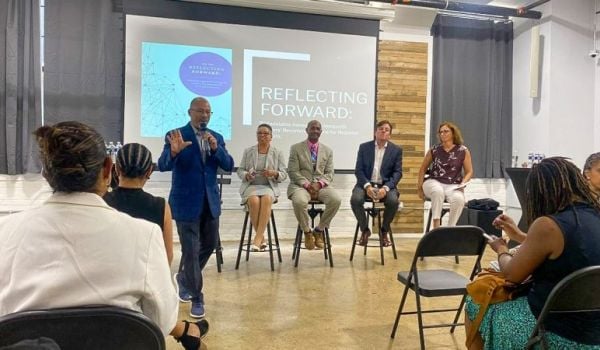Thirteen panelists gathered at the University of Pennsylvania this morning for the Philadelphia stop of the World Urban Forum’s pre-conference dialogue series. While their knowledge base spanned from legacy cities in the U.S. to ballooning informal settlements in the developing world, they found common ground in the idea that making cities more sustainable and more equitable shouldn’t be separate conversations.
First to speak was Yamina Djacta, officer in charge of UN-Habitat’s New York base and one of the event’s hostesses. She put the basis for shared goals this way: “The consequences of inequality hamper all aspects of human development.”
Even with the shared task of fighting inequality and environmental degradation writ large, the range of experts on hand made it impossible to imagine one solution or roadmap for making the world’s cities more sustainable. If anything, the common refrain for moderator Eugenie Birch, co-director of the Penn Institute for Urban Research and a Next City board member, was that “context matters.”
With that in mind, here are five interesting points raised at the pre-conference today that we’re still mulling over:
- The conventional wisdom on moving research to practice should flip. Mark Alan Hughes, a professor of practice at PennDesign and a onetime Next City columnist, broke down the conventional wisdom on turning academic findings into action into three elements: One, translating those findings; two, picking out the answers to the problems at hand; three, accepting researchers’ claims because of their expertise. Hughes called for a “polar vortex to invert all three.” Where would he start? Nix the translation zone and form a “collective intelligence,” with planners and academics working together.
- Advancements in technology can only help public health so much. “Telemedicine can’t fix the problem alone,” said Maureen George, a nursing professor of family and community health. Her work took her to northern Greece, where a lack of public health facilities makes residents depend on charity clinics. The challenge of healthcare, she said, remains contending with “complex human behavior.”
- School closures have a serious ripple effect. The 32 Philadelphia schools that have closed or are in the process of closing this year add 101 acres to the city’s vacant land problem. Yeesh.
- You’ve probably heard that the rate at which the world is urbanizing is astonishing, but it is really, really astonishing. Devesh Kapur, director of Penn’s Center for the Advanced Study of India, said that India is currently urbanizing at a rate of a 1 million new city dwellers per month, and that rate is projected to continue for the next 40 years. Moreover, the global population of people living in informal settlements, at present around 1 billion, will double over the next quarter-century, according to landscape architecture professor David Gouverneur. “If we don’t meet the speed of urban dynamics,” Gouverneur cautioned, “we’re losing the battle.” Which brings us to:
- Informality isn’t going anywhere. “Informal settlements were meant to be transient and disappear with modernization, but that’s not what happened,” said former Lauder Institute fellow Shahana Chattaraj. She pointed to several informal systems — we’ve covered many of her examples, like Nairobi’s matatu bus system — that are not only useful, but also quite sophisticated.
The next pre-conference session, to be held at the University of Chicago on March 4, will focus on data-driven methods for making cities more resilient. This event is free. Register for it here.

Cassie Owens is a regular contributor to Next City. Her writing has also appeared at CNN.com, Philadelphia City Paper and other publications.
Follow Cassie .(JavaScript must be enabled to view this email address)

_920_613_80.jpg)














